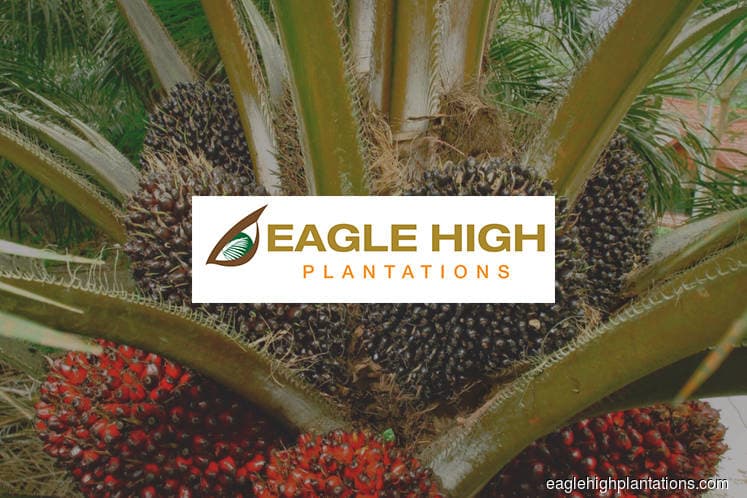
KUALA LUMPUR (Feb 22): Eagle High Plantations Tbk has come out to defend itself in light of resurfacing criticism of its operational practices and claims that the company's financial performance is heading south.
In a statement today, Eagle High justified its stake sale to the Federal Land Development Authority (Felda) that was concluded last year, and dismissed claims that the exercise is a bailout that left investors with Eagle High shares whose prices are dwindling.
"In 2017, we have seen our cash flows improve as we refocused on increasing production and yields from existing planted areas with young age profiles, rather than opening new areas with new plantings," it said.
Eagle High said its sales revenue had risen 40.2% for the nine-month period ended Sept 30, 2017 compared to the previous corresponding period, with operational income skyrocketing to 229.7 billion rupiah from 4.9 billion rupiah.
The Indonesian oil palm plantations group went on to say that the improved performance was "directly attributed" to the partnership between itself and Felda, but did not elaborate.
"Given these encouraging developments, we are confident that the strategic partnership will continue to bring about positive results for both the companies and the oil palm industry," it added.
It also denied any allegations of tax evasion and financial improprieties, saying it is a public-listed entity which complies with the accounting standards and reporting practices as required by laws and regulations "especially on taxation".
Additionally, the Roundtable on Sustainable Palm Oil (RSPO) member said it is fully committed towards a "time-bound plan" for the certification of its mills and estate complexes by the organisation.
"Eagle High would like to reiterate that it is fully committed to sustainable palm oil practices, including complying to national and international sustainability standards and certifications.
"Our track record speaks for itself. To date, two of our mills and estate complexes have attained Indonesian Sustainable Palm Oil (ISPO) certification while the rest are under various stages of the audit and certification process," said the group.
"We are confident that given these positive developments, we will meet all the required sustainability standards by ISPO in due time," it added.
"Eagle High places great importance in ensuring that open and transparent communications are maintained between the company and all its stakeholders.
"We welcome any queries or requests for clarification from any interested parties, including the International Palm Oil Monitor (IPOM)," it said.
The media reported on Tuesday that IPOM had issued a statement pointing to Eagle High's financial improprieties, including cashflow issues, excessive borrowings, and tax evasion among others, based on a due diligence report by audit firm KPMG sighted by the oil palm watchdog.
It also highlighted that Eagle High was loss-making in 2015 and 2016, and pointed to its share price, which has declined since Felda concluded its 37% non-controlling stake acquisition of Eagle High for US$505.4 million (RM2.26 billion in April 2017).
The purchase, done via Felda's unit FIC Properties Sdn Bhd, valued Eagle High shares at an indicative 580 rupiah apiece — or a 95% premium to Eagle High's closing price when the deal was struck. Shares of Eagle High closed at 226 rupiah on Thursday.
IPOM, according to the report, further said that the EU's decision on April 2017 to only import sustainable palm oil after 2020 — referring to the ban on vegetable oil-based biofuels — will not bode well for Eagle High "as its lack of RSPO and ISPO certifications have been widely documented".
"Given this, it is unlikely Eagle High's revenues will improve in the coming years. It is more likely to decline once the European Union regulation takes effect," IPOM said in its report.
Details revolving around the Felda-Eagle High episode have also raised eyebrows for other reasons.
The Edge Malaysia weekly, in its final edition in December 2017, reported that FIC Properties was originally mandated to buy non-plantation assets.
The acquisition — initially planned between Eagle High and Felda Global Ventures Holdings Bhd (FGV) — was also made with government funding, the weekly reported, raising questions on whether Felda would have been able to obtain the funding on its own.